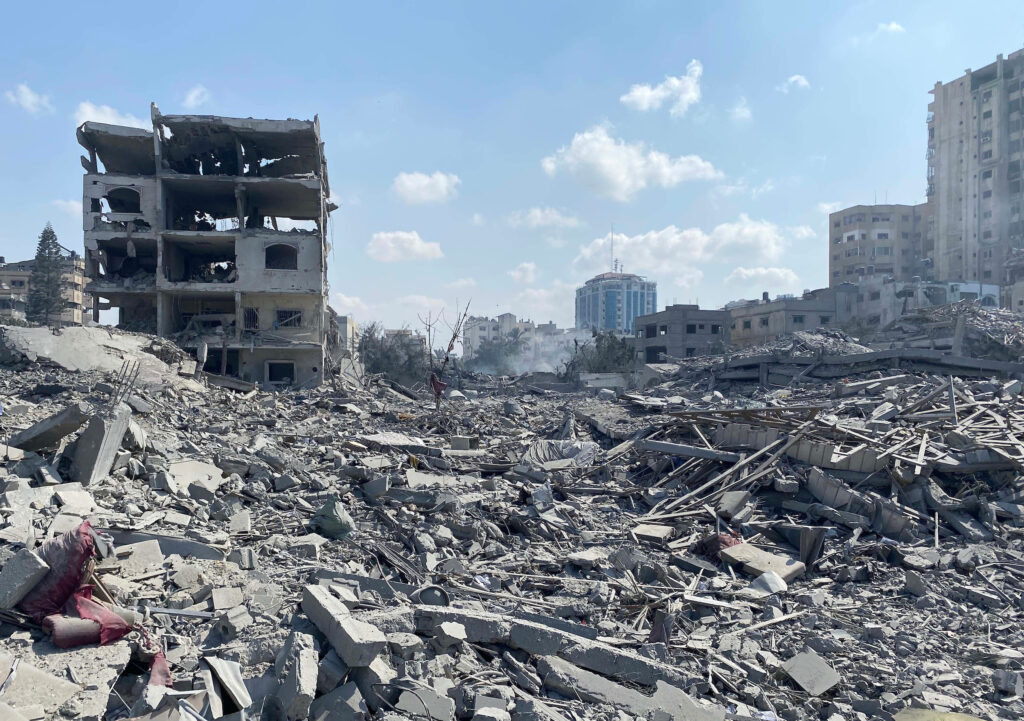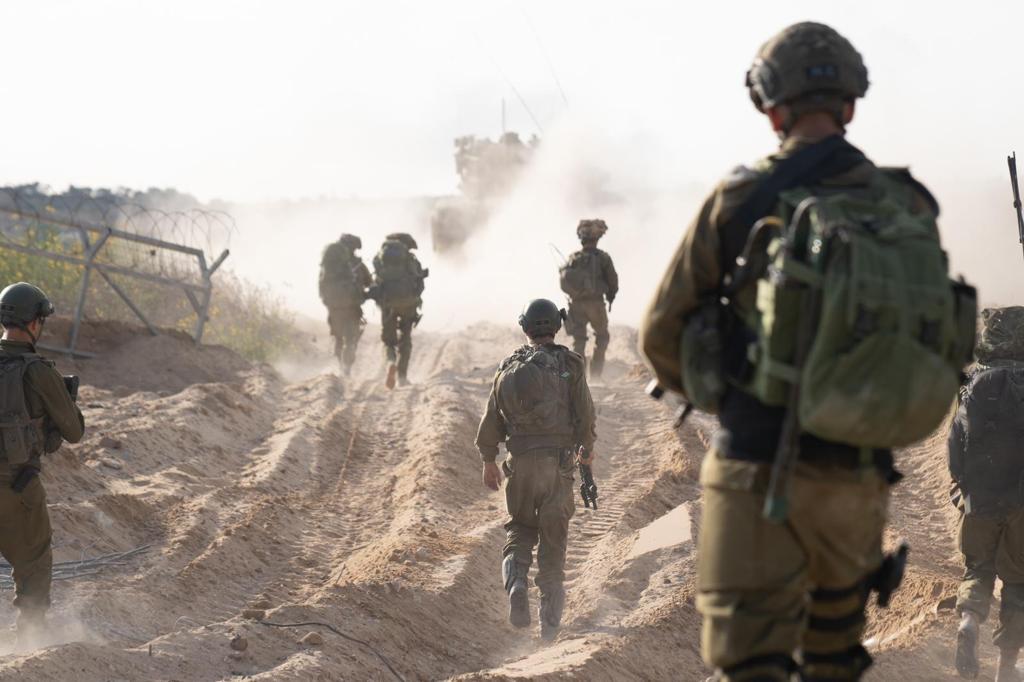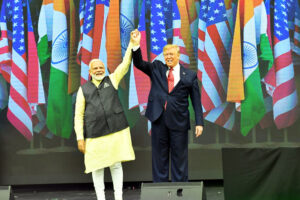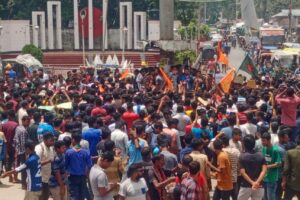
The ongoing conflict in
the Middle East poses
a serious challenge to
the global order and
particularly to India,
which has deep strategic
interests across the
entire region. A peaceful
resolution post the US
election would be in the
best interests of all
After Hamas carried out the
deadliest attack on Israeli civilians in history on October 7, 2023, Israel responded with a devastating military campaign in the Gaza Strip. Israeli Prime Minister Benjamin Netanyahu vowed to finish Hamas completely, militarily and politically, for all time to come. The air and ground operations by the Israeli forces have resulted in almost 40,000 deaths, according to different estimates. The barbaric attack on October 7 resulted in the death of approximately1,200 Israeli civilians and 250 unarmed
civilians were taken as hostages. Even after one year of the conflict, 64 Israelis are still held captive with no knowledge of their
whereabouts, while 117 have been freed and 70 confirmed dead.
After the US enforced the mediated
one-week truce from November 24, 2023, Hamas freed 80 Israeli hostages along with 25 Thai farm workers who were held captive, and Israel released 240 Palestinian prisoners. Israel allowed aid into Gaza via Egypt during which many countries, including
India, sent humanitarian assistance to Gaza. However, the humanitarian conditions remain grim.
As Israel stepped up the attacks on
Gaza, it was apparent that the conflict would
engulf a wider area in a matter of time. On
April 13, 2024, Iran launched an attack on
Israel with drones and missiles in retaliation
for the deadly attack on its consulate in Damascus, Syria. Then, on October 3 this year, Iran once again attacked Israel with
approximately 200 ballistic missiles—with both sides claiming success.
The Israeli military stated that most of
the Iranian missiles were intercepted by its Iron Dome air defence system along with the US air defence batteries. However, they admitted that a small number of missiles struck central and southern Israel. TV footage showed several missiles hitting areas
around Nevatian air base in the Negev desert and close to the headquarters of
Mossad—Israel’s spy agency—in Tel Aviv.
The Israeli military accepted that its military bases were hit but without any operational loss. At the same time, Iranian state
media quoted the Islamic Revolutionary
Guards Corps (IRGC) stating that the missiles hit Nevatim, Hatzerim, and Tel Nof air bases and a gas installation in the southern
city of Ashkelon. Another Iranian news
agency, Tasnim, said that Iran for the first
time used Fattah hypersonic missiles as well
as Emad and Qadr missiles.
Iran’s IRGC further stated that the missile attack was carried out in retaliation to
what it called “violation of Iran’s sovereignty” and the martyrdom of Hamas leader
Ismail Haniyeh, who was killed in an explosion in Tehran. It also said that the attack was in response to the Israeli air strike in southern Beirut that killed Hezbollah leader Hassan Nasrallah and Brig. Gen. Abbas Nilforoushan, the operations commander
of IRGC’s overseas arm, the Quds Force. On October 26, Israel launched a counterattack on Iranian military targets in what appeared to be a highly calibrated response that
avoided energy and nuclear installations. This appeared to be in sync with what
Americans expressed to Iran: avoid energy and nuclear installations to prevent rapid escalation of the conflict. US President Joe Biden and UK Prime Minister Keir Starmer
came out strongly in support of the Israeli right to self-defence.
The failure of the Iranian largescale
missile attack to inflict substantial damage on any military or civilian targets is a testimony to the resilience of Israel’s air defence
systems that are jointly manufactured by the
US and Israel. It is primarily a three-layered system comprising the Iron Dome, David’s Sling and Arrow systems. The Iron Dome

India since long has had
strategic relationships
with both Israel and Iran.
India’s strategic relationship with Israel has grown
in strength since the establishment of full diplomatic ties in 1992. India’s
ties in defence, aerospace,
security and many other
fields have grown further
under the present Modi
administration.
The IDF boots on the ground clearing theHamas’strong holds in Gaza
intercepts short-range (up to 70 km) rockets and missiles up to an altitude of 10 km, whereas David’s Sling intercepts mediumto long-range (up to 300 km) missiles at a maximum altitude of 15 km. The Arrow
system intercepts long range (up to 2,400 km) ballistic missiles which fly outside
Earth’s atmosphere at a maximum altitude of 100 km.
Iran and Hezbollah, which the Shiite theocratic state describes as an “Axis of
Resistance”, have a long history of skirmishes with Israel. Hezbollah, the ‘Party of God’, was formed in the early 1980s with support from Iran’s supreme leader,
Ayatollah Khomeini, in response to Israel’s occupation of Lebanon. On the other hand,
Israel views one of the most well-armed militias and Iran as a threat to its existence.
Netanyahu has said that Israel will continue to strike Lebanon with full force until
Hezbollah stops firing rockets at Israel. The exchange of fire between the two started soon after the October 7 Hamas attack and
has resulted in the death of almost 800 people and displacement of thousands.
Hezbollah’s tactics of guerrilla warfare, using civilian areas for cover, and the use of rockets have shaped Israel’s military and
political strategies. Israel long avoided getting into Lebanon but with the present conflict scenario, where Hezbollah has been
actively targeting northern Israel, a ground
offensive by the Israeli Defence Forces (IDF) in Southern Lebanon was always on the cards.
The Middle East conflagration has serious implications for India. The Ministry of External Affairs has repeatedly stated that
“it’s important that the conflict in the
Middle East doesn’t take a wider regional dimension” and it urged that all issues be addressed “through dialogue and diplomacy”. Prime Minister Modi has spoken to Palestinian President Mahmoud Abbas,
Netanyahu and Iranian President Ebrahim Raisi to resolve the crisis at the earliest.
India since long has had strategic relationships with both Israel and Iran. India’s strategic relationship with Israel has grown
in strength since the establishment of full
diplomatic ties in 1992. India’s ties in defence, aerospace, security and many other fields have grown further under the present Modi administration. India cannot forget the critical help which Israel provided in the past especially during the Kargil conflict. India’s relationship with Iran also has a long history. In recent years, Iran has been a reliable partner with its crude supplies and support of India’s stand on terrorism emanating from Pakistan and Afghanistan.
Iran also plays a leading role when it comes to India’s access to the Central Asian
countries. The Chabahar port project is of
great strategic and economic importance to India, Iran and Central Asian countries
Any escalation in tension in the Middle East is likely to cause problems for India as almost 90 lakh Indians live and work in the Shiite
state. The Middle East is one of India’s major trading partners and produces almost 80% of the world’s crude. This crisis has also stalled the ambitious India-Middle East Economic
Corridor (IMEEC) project that was announced at the last G20 Summit in New
Delhi.
The ongoing conflict in the Middle East
between Israel and Iran along with its proxies
like Hamas in Gaza, Hezbollah in Southern
Lebanon and Houthis in Yemen has perilous
consequences for the world. As for India, it is
turning out to be a delicate balancing act,
given New Delhi’s history of good relations
with the majority of Middle Eastern countries and its deep strategic interests in the
region. With the UN being ineffective and
having a lack of any leverage and the US
being in the middle of a hotly contested election, there is no effective mediator available
at the moment to cool tensions. Other
regional groupings like the Organisation of
Islamic Countries, the Gulf Cooperation
Council and the European Union have failed
to negotiate a solution. The only remaining
hope is that, post the US presidential election, when a new US president takes charge,
Washington will broker a peaceful solution
between Israel, Iran and the Palestinians. Till
then India should play a conciliatory role to
ensure that the conflict doesn’t escalate




Add Comment